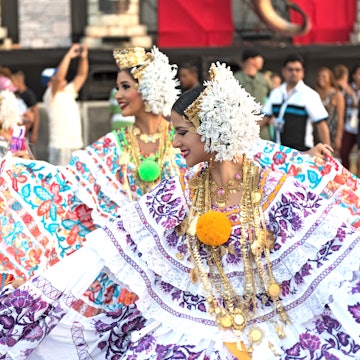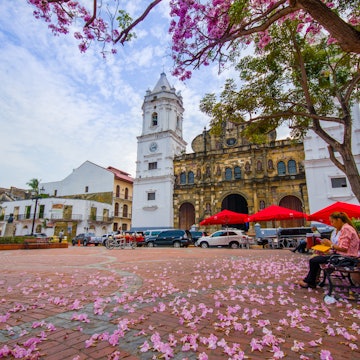

The BioMuseo was created in 2014 and is 4,000 square meters with eight permanent exhibition galleries and a public atrium Martina Gili/Lonely Planet
Panama City is famous for its ultramodern skyline. But architecture in Panama is much more that just skyscrapers. While popular ‘barrios’ (neighborhoods) are developing in all directions amid historic sites, a new wave of designers and architects are bringing creativity to the tropical capital. Here are 5 Instagram-worthy buildings to snap in Panama City.

The BioMuseo
Imagined by Canadian designer Frank Ghery, the colorful BioMuseo on the Amador Causeway was completed in 2014 and represents the creation of the Panamanian isthmus 2.8 million years ago. As it emerged from the oceans, the strip of land that is now known as Panama became a biological corridor between two continents and two oceans, allowing for the migration of species from North to South. With natural light shining through tall glass windows, the eight pavilions are connected by a winding path that overlooks the Panama Canal. Along with the modern building, the museum also has a public atrium for temporary exhibitions, as well as, a botanical garden.

YOO Panama
In line with the previous work of founders John Kitchcox and Philippe Stark, YOO Panama is a residential building that brings together quirky design and modern architecture. Overlooking the ocean, on the trendy and central Avenida Balboa, the YOO stands out with its airy, bright and luxurious apartments and dreamy amenities. The heated pool on the rooftop offers a 5-star hotel experience to residents, who can also enjoy a top-notch spa, gym, party room and spacious playroom for children. But don’t worry, even if you don’t live at the YOO, visitors can peek into the imaginative world of the Philippe Stark by booking a table at one of the fine-dining restaurants. The Asian fusion Chin Chin is located on the building’s ground floor, perfect for a weekday lunch, while the Mediterranean Cabana offers a majestic view over the bay at sunset and is an ideal spot for a romantic dinner.

Innova 109
Launched in 2017, Innova 109 is the new co-working space run by Panama City’s Center of Innovation. The startup accelerator and tech hub is a modern enclave amid the living vestige of the controversial — and somewhat forgotten — history of US occupation in Panama. The area of the City of Knowledge, where this ex-church turned into office space is located, has served as one of the military bases inside the Canal Zone until 1999. For almost a century, it’s been home to thousands of so-called ‘Zonians’ (Americans living in the Canal Zone), who enjoyed the perks of tropical living in combination with American modern comforts until the ownership of the Canal was officially returned to Panama. Today, the City of Knowledge, of which Innova 109 is part, serves as a campus for international schools, NGOs and a number of residential homes.

Panama Viejo
Buried under a suburban residential neighborhood on the outskirts of Panama City lay the ruins of the first European settlement on the Pacific side of the Americas. Founded in 1519 by Spanish conquistador Pedro Arias de Ávila, Panama Viejo is the oldest colonial architectural landmark in the country. Panama was South America’s gate to Europe, as well as the main export channel of Peruvian gold and silver, while under Spanish rule for over 150 years. In 1971, the city was sacked by Captain Henry Morgan and relocated to what is now known as Casco Viejo. Panama Viejo was declared a UNESCO World Heritage Site in 1997 and is one of the most visited sights of the capital.

Metropolitan Cathedral, Casco Viejo
Metropolitan Cathedral of Panama is the most impressive building in the historic district of Casco Viejo and one of the largest churches of Central America. Overlooking the Plaza Mayor, the Cathedral has been part of some of the most relevant happenings in the history of Panama. Following the sacking of Panama’s old town (now known as ‘Panama Viejo’), a new city was erected in Casco Viejo. The church was completed in 1796 and was adorned with 10 beautiful stained glass windows influenced by the Art Déco movement at the beginning of the 20th century. With narrow cobblestone streets and colorful colonial mansions, Casco Viejo is now the second-most visited area in town, home to boutique hotels, rooftop bars and gourmet restaurants. The Cathedral, whose actual name is Catedral Basílica Santa Maria la Antigua de Panamá, is currently undergoing major renovations.
https://shop.lonelyplanet.com/products/panama-travel-guide-7?via=Z2lkOi8vbG9uZWx5LXBsYW5ldC9Xb3JrYXJlYTo6Q2F0YWxvZzo6Q2F0ZWdvcnkvNTllZTQ5YzFmOTJlYTE0MTg2MDU4N2Ez
Take your Panama trip with Lonely Planet Journeys
Time to book that trip to Panama
Lonely Planet Journeys takes you there with fully customizable trips to top destinations – all crafted by our local experts.
























